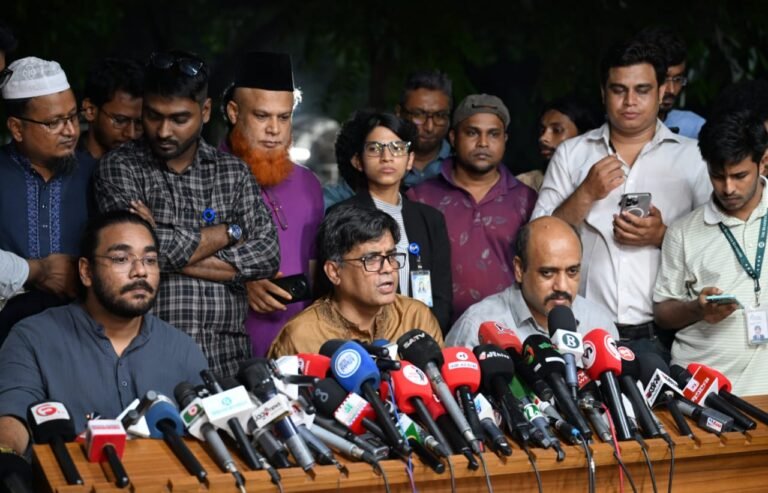Chief Adviser Prof Muhammad Yunus reaffirmed on Sunday that he will not remain in office beyond 30 June next year and that a national election will be held before that deadline.
“Prof Yunus made it clear that the election would take place between December and 30 June. He said he will not stay in the chair even for a single day after 30 June next year,” Chief Adviser’s Press Secretary Shafiqul Alam told reporters during a press briefing outside the state guest house Jamuna, following a meeting between Prof Yunus and leaders from several political parties on Sunday night.
The meeting was held to discuss key national issues, including political reforms and the upcoming general election.
According to Shafiqul, Prof Yunus told the leaders, “We are in a state of war. After banning the Awami League, they are trying to destabilise the country. We must protect ourselves from this.”
He also emphasised the need for unity, saying, “We must overcome divisions and maintain consensus. There is a conspiracy, both inside and outside the country, aimed at pushing us back into subjugation. They are trying to destabilise the country.”
Shafiqul further stated that Prof Yunus assured everyone he would not support any action that harms the country, and that he would feel personally responsible if he failed to hold a free and fair election. He said the political party leaders at the meeting expressed their full support for Prof Yunus, his reform plans, efforts towards justice, and his commitment to holding the election.
After the first round of discussions, Nagorik Oikya Convenor Mahmudur Rahman Manna told reporters that the Chief Adviser had spoken about the country’s current crisis.
“He said the country is in a deep crisis due to Indian hegemony, and that national unity is essential to overcome it,” Manna said.
During the talks, party leaders urged Prof Yunus to get directly involved in politics and asked him to clearly state the election date and explain how the election would be conducted. Manna said Prof Yunus responded by saying that if fewer reforms are required, the election would be held in December. If more reforms are needed, it would be held in June. He added that the Chief Adviser was willing to submit his resignation if the election did not take place before the end of June.
Manna also said that Prof Yunus was disappointed with a recent meeting of the advisory council, which led him to consider resigning.
AB Party Chairman Mojibur Rahman Monju told reporters that the interim government would hold the election if a fair and peaceful environment could be ensured. He said they had asked Prof Yunus why he had considered stepping down.
“He told us that he does not feel the current environment is suitable for holding a fair election. But if the right conditions are in place, he will proceed with the polls,” Monju said. He added that although they had proposed 5 February as a possible election date, they were flexible on the matter.
Communist Party of Bangladesh (CPB) leader Mujahidul Islam Selim said both reforms and elections are needed, and that for reforms to be meaningful, public participation must be guaranteed.
He argued that a proper election is essential to ensure that participation and that necessary reforms must take place first.
Revolutionary Workers Party of Bangladesh general secretary Saiful Huq said they had told the Chief Adviser there seemed to be a lack of coordination among the advisers, with each one giving different messages.
Islami Andolan Bangladesh Ameer Rezaul Karim, in a statement, said his party had called for local government elections to be held before the national election.
He also demanded reforms, a visible trial of the July massacre, and consultations before decisions were made on sensitive national issues.
According to the Chief Adviser’s Press Wing, Prof Yunus held talks with leaders of 17 political parties in two phases on Sunday evening.
In the first phase, 11 political leaders met with him, including Colonel (Retd) Oli Ahmad of the Liberal Democratic Party, Mahmudur Rahman Manna of Nagorik Oikya, Saiful Huq of the Revolutionary Workers Party of Bangladesh, Zunayed Saki of Ganosamhati Andolan, Hasnat Kaiyum of Rastro Songskar Andolon, Mojibur Rahman Monju of AB Party, Mujahidul Islam Selim of the Communist Party of Bangladesh, Khalequzzaman of the Socialist Party of Bangladesh, Tipu Biswas of the National People’s Front, Sheikh Rafiqul Islam Babul of Bhashani Onushari Parishad, and Shahid Uddin Mahmud Swapan of Jatiya Samajtantrik Dal (JSD).
In the second round of talks, other leaders were present, including Maulana Sadikur Rahman, Maulana Rezaul Karim of Islami Andolan Bangladesh, Maulana Mamunul Haque of Hefazat-e-Islam Bangladesh, Maulana Ahmed Abdul Kader of Khelafat Majlis, Maulana Azizul Haque of Hefazat-e-Islam Bangladesh, Maulana Monjurul Islam Afendi of Jamiat Ulema-e-Islam, Nurul Haque Nur of Gono Odhikar Parishad, Maulana Musa Bin Izhar of Hefazat-e-Islam, and Maulana Sakhawat Hossain Razi of Islami Oikya Jote.
The meetings were held amid increasing political tension and rumours that the chief adviser was considering resignation.
The discussions followed another round of talks held the day before between Prof Yunus and members of the BNP, National Citizen Party (NCP), and Jamaat-e-Islami.



